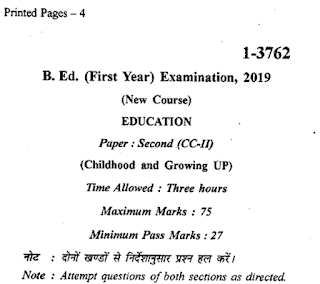Childhood and Growing UP या बाल्यावस्था एवं बड़ा होना previous question paper B.Ed.(First Year) APSU REWA
कृपया उत्तर कमेंट बॉक्स में दें
 |
| कृपया कमेंट में उत्तर हमारे साथ शेयर करें - |
- USEFULL LINKS:
Childhood and Growing UP B.Ed.(First Year) या बाल्यावस्था एवं बड़ा होना
B. Ed. (First Year) Examination, 2019
(New Course)
EDUCATION
Paper: Third
(Childhood and Growing UP)
Time Allowed: Three hours
Maximum Marks: 75
Minimum Pass Marks: 27
नोट : खण्ड अ से कोई 11 एवं खण्ड-ब से कोई दो प्रश्न कीजिए। अंक विभाजन खण्डों के समझ दिया गया है।
Note: Attempt any 11 question from section-A and any two question from section-B. Distribution of marks is given against both sections.
Section -'A
11 x 5 =55
- मनोविज्ञानी ''मानव व्यवहार का विज्ञान है।'' इस कथन की पुष्टि करें।
Psychology is the "Science of human behaviour". Elucidate this statement. -
सामाजिक सांस्कृतिक संदर्भ क्या है? विकास को यह कैसे प्रभावित करता है?
What is Socio cultural context? How does it influence development. - विकास की अवलोकन विधि को संक्षेप में समझाइए
Explain the short observation method of development. -
बाल्यावस्था में मानसिक तथा शारीरिक विकास की विशेषताएँ लिखिए।
Write mental and physical developmental characteristics in childhood. - बाल विकास में वंशानुक्रम तथा वातावरण के महत्व की समझाइए
Explain the importance of heredity and atmosphere on child development - दलित बच्चों की शैक्षिक कठिनाइयों को संक्षेप में समझाइए
Describe in brief educational difficulties of Dalit Children. - संवेग को परिभाषित कीजिए मुख्य संवेगों को सोदाहरण लिखिए।
Define Emotion, Write main emotions with examples. - एकीकृत व्यक्तित्व की विशेषताओं को संक्षेप में समझाइए।
Discuss the characteristics of Integrated personality in brief. -
परिवार तथा बालक के संबंध को निर्धारित करने वाले कारक कौन कौन से हैं?
Which are the determining factors of family and child relationship. -
बालकों के हिंसक व्यवहार के कारण कौन-कौन से हैं?
Which are the causes of violent behaviour of children? -
लैंगिक भूमिका की अवधारणा स्पष्ट कीजिए.
Clarify the concept of gender role. -
इरिक्सन के मनोसामाजिक विकास सिद्धान्त के मुख्य बिंदुओं का उल्लेख कीजिए।
Mention main points of psychosocial theory of development by Erikson. -
बाल विकास में जनसंचार को भूमिका पर चर्चा कीजिए।
Discuss the role of media on child development. - नैतिक विकास का अभिप्राय स्पष्ट कीजिए।
Clarify the meaning of moral development.
2x10=20
Section-B
(दीर्घ उत्तरीय प्रश्न)
(Long Answer Type Questions)
नोट: किन्हीं दो प्रश्नों के उत्तर दीजिए। प्रत्येक प्रश्न 10 अंकों का है। प्रत्येक प्रश्न का उत्तर लगभग 400-500 शब्दों में दीजिए।
Note: Attempt any two questions. Each question carries 10 marks. Each question should be answered in 400-500 words
-
शिक्षा मनोविज्ञान की अवधारणा समझाइए। इसके महत्व को प्रतिपादित
कीजिए।
Explain the concept of educational psychology. Establish its importance. - सिगमण्ड फ्रायड के मनोविश्लेषणात्मक सिद्धान्त को विस्तार से व्याख्या
कीजिए।
Illustrate elaborately the psychoanalytical theory by Sigmond Freud. - "किशोरावस्था को जीवन का सबसे कठिन काल कहते हैं।" कथम की तार्किक व्याख्या कीजिए।
"Adolescence is called the most difficult period of life." Explain the statement factfully. - निम्नांकित में से किन्हीं दो पर टिप्पणी लिखिए
(a) बालक का समाजीकरण
(b) जीन पियाजे का संज्ञानात् विकास सिद्धान्त
(c) सामाजिक विकास तथा प्रभावित करने वाले कारक
Write notes on any two of the following
(a) Socialization of child
(b) Cognitigive development theory of Jean Piaget (c) Social Development and influencing factors


0 टिप्पणियाँ
आपके सुझाव सादर आमंत्रित है